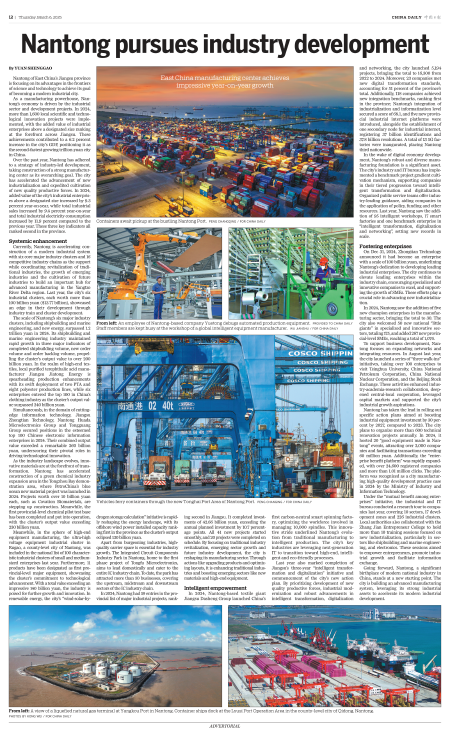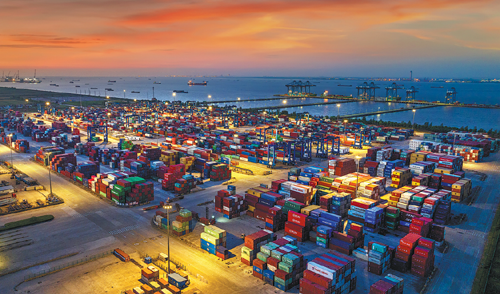
Containers await pickup at the bustling Nantong Port.
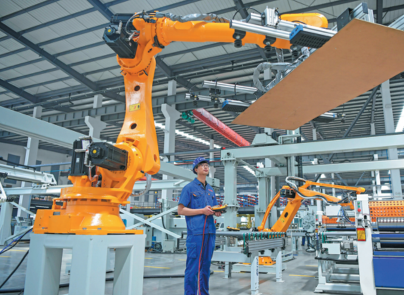
An employee of Nantong-based company Yuetong debugs automated production equipment.
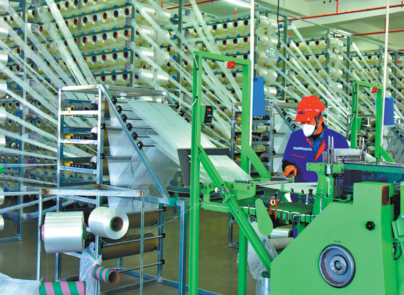
Staff members are kept busy at the workshop of a global intelligent equipment manufacturer.
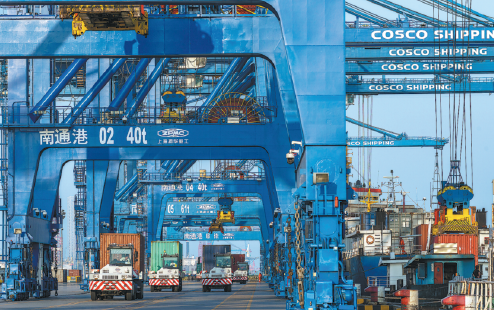
Vehicles ferry containers through the new Tonghai Port Area of Nantong Port.

From left: A view of a liquefied natural gas terminal at Yangkou Port in Nantong. Container ships dock at the Lyusi Port Operation Area in the county-level city of Qidong, Nantong.
Nantong of East China's Jiangsu province is focusing on its advantages in the frontiers of science and technology to achieve its goal of becoming a modern industrial city.
As a manufacturing powerhouse, Nantong's economy is driven by the industrial sector and development projects. In 2024, more than 1,600 local scientific and technological innovation projects were implemented, with the added value of industrial enterprises above a designated size ranking at the forefront across Jiangsu. These achievements contributed to a 6.2 percent increase in the city's GDP, positioning it as the second-fastest growing trillion-yuan city in China.
Over the past year, Nantong has adhered to a strategy of industry-led development, taking construction of a strong manufacturing center as its overarching goal. The city has accelerated the advancement of new industrialization and expedited cultivation of new quality productive forces. In 2024, added value of the city's industrial enterprises above a designated size increased by 9.3 percent year-on-year, while total industrial sales increased by 9.4 percent year-on-year and total industrial electricity consumption increased by 11.9 percent compared to the previous year. These three key indicators all ranked second in the province.
Systemic enhancement
Currently, Nantong is accelerating construction of a modern industrial system with six core major industry clusters and 16 competitive industry chains as the support while coordinating revitalization of traditional industries, the growth of emerging industries and the cultivation of future industries to build an important hub for advanced manufacturing in the Yangtze River Delta region. Last year, the city's six industrial clusters, each worth more than 100 billion yuan ($13.77 billion), showcased an edge in their development through industry train and cluster development.
The scale of Nantong's six major industry clusters, including shipbuilding and marine engineering, and new energy, surpassed 1.2 trillion yuan in 2024. Its shipbuilding and marine engineering industry maintained rapid growth in three major indicators of completed shipbuilding volume, new order volume and order backlog volume, propelling the cluster's output value to over 200 billion yuan. In the realm of high-end textiles, local purified terephthalic acid manufacturer Jiangsu Jiatong Energy is spearheading production enhancements with its swift deployment of two PTA and eight polyester production lines, while six enterprises entered the top 100 in China's clothing industry as the cluster's output value surpassed 240 billion yuan.
Simultaneously, in the domain of cutting-edge information technology, Jiangsu Zhongtian Technology, Nantong Huada Microelectronics Group and Tongguang Group secured positions in the esteemed top 100 Chinese electronic information enterprises in 2024. Their combined output value exceeded a remarkable 260 billion yuan, underscoring their pivotal roles in driving technological innovation.
As the industry landscape evolves, innovative materials are at the forefront of transformation. Nantong has accelerated construction of a green chemical industry expansion area in the Tongzhou Bay demonstration area, where PetroChina's blue ocean new material project was launched in 2024. Projects worth over 10 billion yuan each, such as Covation Biomaterials, are stepping up construction. Meanwhile, the first provincial-level chemical pilot test base has been completed and put into operation, with the cluster's output value exceeding 230 billion yuan.
Meanwhile, in the sphere of high-end equipment manufacturing, the ultra-high voltage equipment industrial cluster in Rugao, a county-level city of Nantong, was included in the national list of 100 characteristic industrial clusters of small and medium-sized enterprises last year. Furthermore, 11 products have been designated as first provincial-level major equipment, showcasing the cluster's commitment to technological advancement. With a total value exceeding an impressive 140 billion yuan, the industry is poised for further growth and innovation. In renewable energy, the city's "wind-solar-hydrogen storage calculation" initiative is rapidly reshaping the energy landscape, with its offshore wind power installed capacity ranking first in the province as the cluster's output eclipsed 130 billion yuan.
Apart from burgeoning industries, high-quality carrier space is essential for industry growth. The Integrated Circuit Components Industry Park in Nantong, home to the first phase project of Tongfu Microelectronics, aims to lead domestically and cater to the entire IC industry chain. To date, the park has attracted more than 50 businesses, covering the upstream, midstream and downstream sectors of the IC industry chain.
In 2024, Nantong had 59 entries in the provincial list of major industrial projects, ranking second in Jiangsu. It completed investments of 42.66 billion yuan, exceeding the annual planned investment by 10.7 percentage points. All 41 new projects started smoothly, and 20 projects were completed on schedule. By focusing on traditional industry revitalization, emerging sector growth and future industry development, the city is reshaping its manufacturing sector. Through actions like upgrading products and optimizing layouts, it is enhancing traditional industries and boosting emerging sectors like new materials and high-end equipment.
Intelligent empowerment
In 2024, Nantong-based textile giant Jiangsu Dasheng Group launched China's first carbon-neutral smart spinning factory, optimizing the workforce involved in managing 10,000 spindles. This innovative stride underlined Nantong's evolution from traditional manufacturing to intelligent production. The city's key industries are leveraging next-generation IT to transition toward high-end, intelligent and eco-friendly processes.
Last year also marked completion of Jiangsu's three-year "intelligent transformation and digitalization" initiative and commencement of the city's new action plan. By prioritizing development of new quality productive forces, industrial modernization and robust advancements in intelligent transformation, digitalization and networking, the city launched 5,194 projects, bringing the total to 16,300 from 2022 to 2024. Moreover, 23 companies met new digital transformation standards, accounting for 51 percent of the province's total. Additionally, 118 companies achieved new integration benchmarks, ranking first in the province; Nantong's integration of industrialization and informatization level secured a score of 68.1, and five new provincial industrial internet platforms were introduced, alongside the establishment of one secondary node for industrial internet, registering 37 billion identifications and 37.8 billion resolutions. A total of 13 5G factories were inaugurated, placing Nantong third nationwide.
In the wake of digital economy development, Nantong's robust and diverse manufacturing foundation is a significant asset. The city's industry and IT bureau has implemented a benchmark project gradient cultivation mechanism, supporting companies in their tiered progression toward intelligent transformation and digitalization. Organized public service teams offer industry-leading guidance, aiding companies in the application of policy, funding and other resources. Last year, Nantong saw the addition of 95 intelligent workshops, 17 smart factories and one benchmark enterprise in "intelligent transformation, digitalization and networking", setting new records in scale.
Fostering enterprises
On Dec 31, 2024, Zhongtian Technology announced it had become an enterprise with a scale of 100 billion yuan, underlining Nantong's dedication to developing leading industrial enterprises. The city continues to elevate leading enterprises within the industry chain, encouraging specialized and innovative companies to excel, and supporting the growth of SMEs. These efforts play a crucial role in advancing new industrialization.
In 2024, Nantong saw the addition of five new champion enterprises in the manufacturing sector, bringing the total to 30. The city also welcomed 50 new national "little giants" in specialized and innovative sectors, totaling 175, and added 287 new provincial-level SMEs, reaching a total of 1,076.
To support business development, Nantong focuses on expanding networks and integrating resources. In August last year, the city launched a series of "three walk-ins "initiatives, taking over 100 enterprises to visit Tsinghua University, China National Petroleum Corporation, China National Nuclear Corporation, and the Beijing Stock Exchange. These activities enhanced industry-academia-research collaboration, deepened central-local cooperation, leveraged capital markets and supported the city's industrial growth aspirations.
Nantong has taken the lead in rolling out specific action plans aimed at boosting industrial equipment investment by 30 percent by 2027, compared to 2023. The city plans to organize more than 600 technical renovation projects annually. In 2024, it hosted 20 "good equipment made in Nantong" events, attracting over 2,000 companies and facilitating transactions exceeding 60 million yuan. Additionally, the "enterprise benefit platform" was rapidly expanded, with over 24,600 registered companies and more than 1.01 million clicks. The platform was recognized as a city manufacturing high-quality development practice case in 2024 by the Ministry of Industry and Information Technology.
Under the "mutual benefit among enterprises" initiative, the industrial and IT bureau conducted a research tour to companies last year, covering 10 sectors, 17 development zones and 226 industrial clusters. Local authorities also collaborated with the Zhang Jian Entrepreneur College to hold more than 10 training sessions focused on new industrialization, particularly in sectors like shipbuilding and marine engineering, and electronics. These sessions aimed to empower entrepreneurs, promote industrial growth and facilitate information exchange.
Going forward, Nantong, a significant birthplace of modern national industry in China, stands at a new starting point. The city is building an advanced manufacturing system, leveraging its strong industrial assets to accelerate its modern industrial development.
